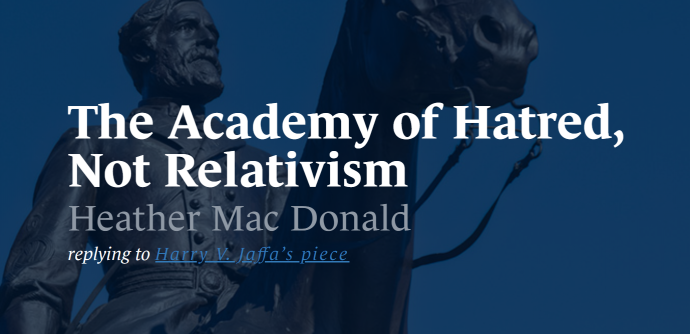Heather Mac Donald makes a good case for her argument that it’s hatred driving the modern academy:
Jaffa was wrong about the root of today’s academic problems.
Relativism and non-judgmentalism lie at the root of today’s academic rot, according to the conservative consensus about the post-1960s university. Harry Jaffa was a prime architect of that consensus. In “The Reichstag Is Still Burning,” he argues that the rejection of a belief in a single truth about our place in the God-created universe gave rise to the student rebellions against the Western canon. Once all cultures were deemed “objectively equal in dignity” and all moral preferences and lifestyles were seen as grounded only in subjective “value judgements,” the erosion of the traditional disciplines and the incursion of identity politics into the university were sure to follow. The solution to the destruction of serious learning, counsels Jaffa, is to recognize once again the “truth about man, God, and the universe” and to make that truth the lodestar of academic activity.
This analysis is unpersuasive.
Watching students attack statues of Confederate soldiers or vandalize buildings they associate with America’s racist past, it is hard to see relativism and non-judgmentalism at work. In fact, today’s students and the left-wing professors responsible for their victim ideology are shrilly judgmental.
They ruthlessly enforce a moral hierarchy of victimhood based on what they know to be the truth: that America is endemically racist and sexist. They are violently intolerant of views that challenge that truth. By contrast, it is the traditionalists who, in defending the past against the student Savonarolas, argue that moral judgements are historically contingent. Sure, the founders may have tolerated slavery, but we should not judge the past with the moral standards of today, the traditionalists say. Jaffa insists that truth is “trans-cultural” and “trans-historical.”
Read more: The American Mind

